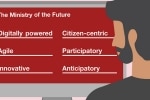Executive summary
Gulf countries are struggling to meet the continuously changing and increasingly complex needs of their citizens. The generous public services of the past are no longer sustainable, due to continued lower oil prices and demographic growth. In this environment, these governments can no longer be the sole provider of public social services — and they should not have to be. Instead, governments can work with not-for-profit organizations (NFPs) and private-sector companies to supplement government offerings, moving social development beyond merely using the government as a provider.
Specifically, Gulf countries could focus on three potential mechanisms that have not yet received attention in the region:
- Build an ecosystem of NFPs, by clarifying what services are needed, making NFPs more financially sustainable, developing organizational capabilities, increasing awareness among the public, creating linkages with the private and public sectors, and putting the right regulatory environment in place.
- Encourage companies to advance from corporate social responsibility, or the alleviation of social misfortune, to corporate social innovation — the creation of a positive agenda, through more capable internal operations and more innovative products and services.
- Implement performance-based payments by the public sector to reward favorable outcomes, including proven mechanisms such as social impact bonds, which bring investors to the market for the most promising social initiatives.
All three of these concepts are entering use elsewhere and generating positive results. By applying all three, these governments can better meet the needs of their growing populations, with higher-quality services, more efficient delivery, and lower government outlays.
Click here for the full report
An unsustainable model for public services
Countries in the Gulf Cooperation Council region have long adopted a generous model for social welfare. The government has been the main provider of jobs for citizens, along with key services in areas such as education, healthcare, and social protection. Over time, however, the burdens of this model have led to a degradation in the quality of services, many of which no longer meet the expectations of citizens or government leaders. These countries consistently rank lower internationally across a range of indicators spanning key social areas such as education, employment, and healthcare.
More troubling, the current model is unsustainable financially and operationally. For decades, the region’s oil economy has paid for the provision of government-backed social services delivered by the public sector. However, an extended period of low oil prices has negatively affected state finances, and many governments simply cannot meet all the needs of all their constituents.
Demographic trends compound the challenge. GCC governments have to deal with multiple generations that have very different lifestyles, habits, needs, and expectations. The social needs of these different groups of citizens are always changing and are increasingly complex. Overall, populations in GCC-region countries are aging, putting a strain on government-funded services. The younger generation is more aware, more connected, more aware of social service provision in other countries, and so is more demanding. The unemployment rate among nationals of these countries is often high, as these economies continue to rely on expatriates for most skilled labor in the short to medium term.
In many countries, social services are shifting away from the traditional model of provision in which public service providers operate in silos. Instead, services are provided through an integrated approach in which NFPs and the private sector supplement government services. Technology is a key enabler of this new approach. Public providers are now adopting IT systems, such as cloud computing, that are designed around the actual needs of recipients, in particular as family units, and that allow these providers to share social need cases with other organizations. Big data is helping agencies tailor services to the needs of individuals while anticipating health or social problems and proactively mitigating them.
Governments therefore should transition to a similar “all of the above” approach, in which the government, public-sector providers, the private sector, and NFPs combine forces to offer public services. There are three potential mechanisms that should be at the top of the agenda for GCC governments: develop an ecosystem of sustainable NFPs, encourage the private sector to become more innovative in addressing social issues, and introduce more innovative social contracting mechanisms such as “social impact bonds.”
Conclusion
The current approach to social services provision in GCC-region countries is unsustainable. Instead, countries can change their approach to move social development beyond the government by creating a vibrant ecosystem of NFPs, encouraging a change in the private sector from corporate social responsibility to corporate social innovation, and financing public services through outcomes-based commissioning models.



















Menu